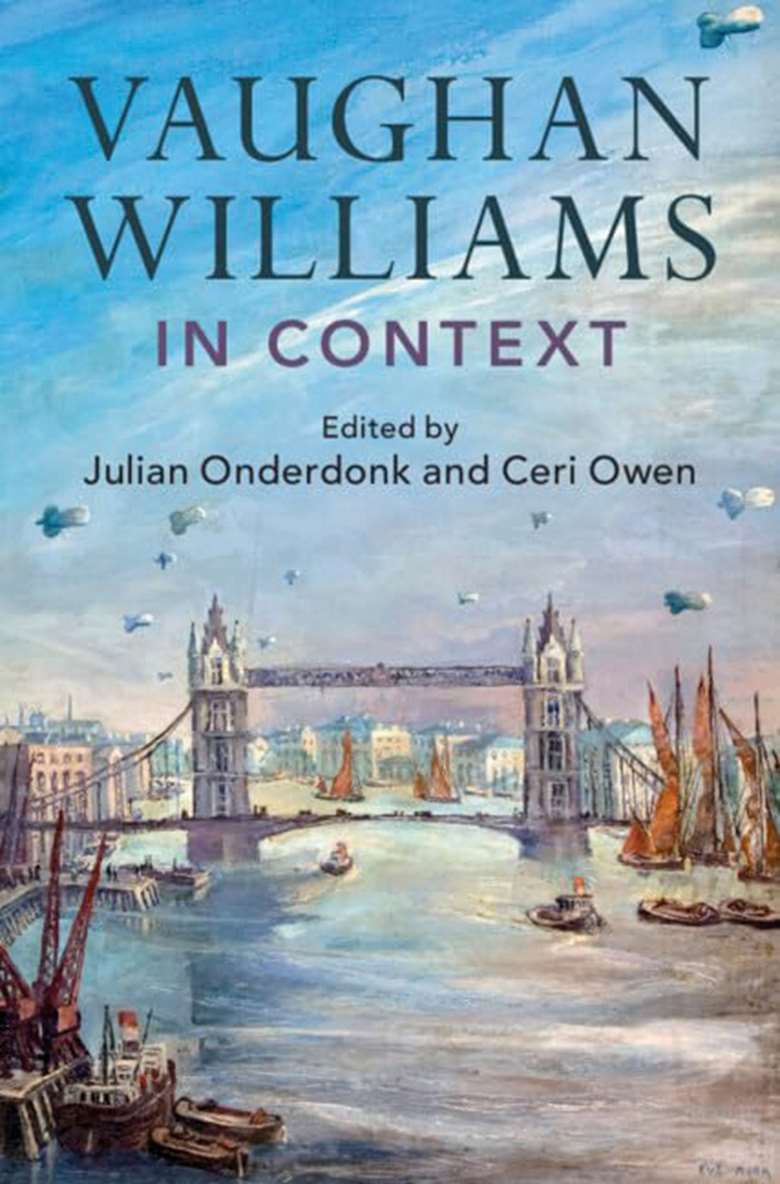Book review - Vaughan Williams in Context, edited by Julian Onderdonk and Ceri Owen
Nigel Simeone
Friday, June 14, 2024
Vaughan Williams in Context offers many fresh perspectives on RVW’s life and times

The blurb for this new book gets off to a strangely defensive start: ‘challenging residual doubts about Vaughan Williams’s role and significance’. Is this inventing a problem that doesn’t exist – inventing an Aunt Sally Vaughan Williams never had? Speaking personally, I can’t imagine what these ‘residual doubts’ might be; putting that to one side, I’m happy to report that Vaughan Williams in Context offers many fresh perspectives on RVW’s life and times. Part 1, ‘Biography, People, Places’, begins with an essay by Alain Frogley on the importance of living in London for RVW, concluding eloquently that his vision ‘originated in the streets of the world’s largest metropolis as much as in the fields and hedgerows of rural England’. David Manning’s ‘Personality’ offers fascinating insights into VW’s public-private persona. Hugh Cobbe edited RVW’s letters and subsequently established the online database of his correspondence – a gold mine for anyone working on the composer. In ‘Correspondence’ Cobbe surveys important groups of letters and highlights the composer’s passionate advocacy of a united Europe (which he shared with Adrian Boult), and his belief in the importance of musical education. Erica Siegel’s ‘Women’ deals sensitively and honestly with a thorny subject: ‘Uncle Ralph’s’ well-known flirtatiousness with younger women. Roger Savage’s ‘Friends Outside Music’ is an invaluable survey of friendships with authors, poets, scholars and historians including a discussion of RVW’s dedication of Toward the Unknown Region to the recently widowed Florence Maitland, ‘making it a kind of Requiem – an agnostic equivalent, perhaps, to Elgar’s “Proficiscere, anima Christiana” of Elgar’s recent Gerontius – for her husband’. This section closes with Karen Arrendale’s absorbing chapter on Cambridge, concentrating on his lifelong friendship with Edward Dent and the university’s vibrant musical life in the years before the First World War.
Part 2, ‘Inspiration and Experiment’, begins with Jeremy Dibble on ‘Early Development’ – absorbing on RVW’s early musical education, and amusing on his organ-playing and his preparations for taking (and passing) his FRCO in 1898. Chapters on RVW’s concept of ‘Romanticism’ (Benedict Taylor) and ‘Amateur Music and Musicians’ (Julian Onderdonk) are followed by Jonathan Clinch’s ‘Performance’, which includes interviews with the likes of Andrew Davis, David Lloyd-Jones (missing his hyphen here), Roger Norrington and Martyn Brabbins. Don’t be put off by the lofty-sounding title of Daniel M Grimley’s ‘Modalities of Landscape’, an insightful and even poetic discussion of RVW’s responses to landscapes.
Part 3, ‘Culture and Society’, covers ‘Politics’ (JPE Harper‑Scott), ‘Liberalism and Landscape’ (Sarah Collins), ‘The English Folk Revival’ (Georgina Boyes), ‘Pageantry’ (Alexander Hutton and Paul Readman), ‘History and the Spirit of Revivalism’ (Deborah Heckert) and two particularly fine chapters on ‘Christian Socialism and The English Hymnal’ (Katie Palmer Heathman) and ‘War’ (Eric Saylor). Part 4, ‘Arts’, begins with ‘Literature’ (Matthew Ingleby and Ceri Owen), which concludes that RVW’s ‘powerful interest in writers such as Whitman and Blake suggests that his cultural nationalism formed part of a broader, international and humanitarian aspiration’. Curiously, this chapter doesn’t have much to say about his settings of liturgical or biblical texts but it has useful comments on his interest in John Skelton. Tim Barringer’s ‘Visual Art’ considers the composer’s wide-ranging enthusiasm for art and its particular importance for Job. Roger Savage on ‘Theatre, 1895-1914’ reveals, as he puts it, that ‘the grown-up Vaughan Williams was decidedly stage-struck’. Rishona Zimring’s ‘Dance’ takes Job (‘a crucial contribution to interwar dance history’) as its focal point. A hugely engaging chapter on ‘Film’ by Peter Franklin ends this section in fine style.
Part 5 considers ‘Institutions’: the ‘Home-Grown Composer’ after the First World War (David CH Wright), concert life (Simon McVeigh), the Arts Council (Andrew Pinnock and Julian Onderdonk), the Second World War (Heather Wiebe) and the BBC (Duncan Hinnells). A chapter on RVW’s publishers would have been welcome here. Part 6, ‘Reception’, opens with an enthralling survey of ‘Reception Outside England, 1901-1914’ (Alan W Atlas), followed by chapters on ‘Interwar Continental Reception’ (Aidan J Thomson) and ‘Early Recordings’ (Ryan Ross), and ending with ‘Reception in the USA’ (Alain Frogley), which documents the impact of RVW’s music in the United States.
I spotted a couple of errors: the premiere of the Fifth Symphony was not conducted by Boult (page 237) but by the composer himself (prior to which RVW and Boult had conducted trial performances at Maida Vale); and it was not ‘premiered by the BBC in 1943’ (page 244), but by the London Philharmonic Orchestra.
I’ve commented before on the cover price of this series, so will say only that I hope an affordable paperback is issued as soon as possible: there is much here to enrich our understanding of Vaughan Williams.
This review originally appeared in the July 2024 issue of Gramophone. Never miss an issue of the world's leading classical music magazine – subscribe to Gramophone today












